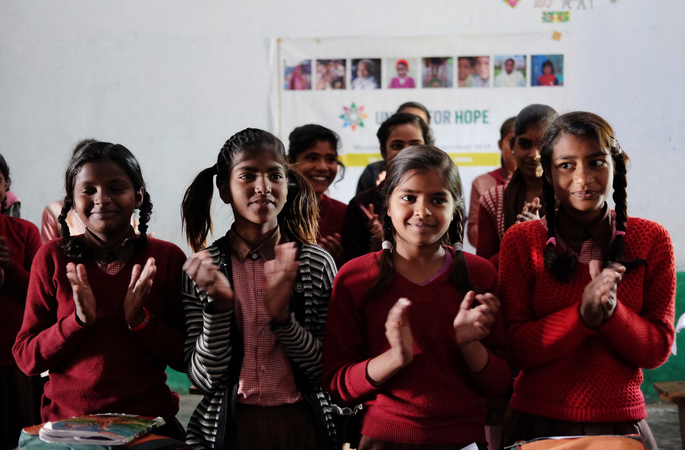An Interview with United for Hope
The United For Hope organisation is an NGO which was formed to empower rural women with knowledge and skills, to encourage them to gain independence and dignity in their lives.
United for Hope was founded in 2014 by Tara McCartney, a UK-Irish citizen and former corporate manager with Microsoft among others. She first visited the Kushinagar district, where the NGO is based, with her Indian husband Vikas Malik. She began interacting with the villagers and the local governing bodies and observed the challenges that existed in bringing access to government schemes and policies.
Slowly, she began her first project of introducing toilets. Thereafter, she went door to door explaining the importance of sanitation and the need for toilets. She won the confidence of 25 families and began the construction.
Motivated by the positive response to this intervention, Tara decided to radically change her life and dedicate her experience and skills to development work. She invested her personal savings and formally set up United For Hope in 2014, with the vision to transform small villages in rural India into prosperous and dignified places, where communities thrive and individuals are empowered to make decisions about their future.
The organisation fulfils its mission by adopting a holistic Smart Village model, with projects structured under three broad pillars: Social Enterprises, Education and Community Support.
FemAsia’s consultant editor Devika Brendon interviews the founders of this organisation to get insight into their efforts to improve women’s knowledge and management of menstrual hygiene, in rural India.
Can you outline the current state of awareness of female menstrual hygiene and its importance for women’s dignity and health, in the world?
Menstruation is a normal biological process and the ability for women and girls all around the world to manage it hygienically and with dignity is a basic human right. Yet, women all over the world still face constant challenges in managing their periods, for reasons that are similar across different regions of the world.
According to the reports written by Loughnan (2017), half a billion women lack access to adequate toilet facilities and have little to no privacy for menstrual hygiene management (MHM). This is true both in home settings as well as in public places, such as schools and workplaces. Studies reveal that most girls during menstruation skip school, resulting in a higher rate of school absenteeism for girls, which affects the economic opportunities of the individual as well as depriving the nation as a whole of full female participation in society.
Adequate menstruation hygiene practices involve more than just infrastructure. According to popular beliefs and cultural norms in some areas of the world, menstruation is often thought of as something ‘dirty’ and ‘impure’ and, because of this, women are systematically marginalised.
According to a study conducted by UNICEF, 1 out of 3 girls in South Asia know nothing about menstruation prior to getting their periods. Stigmas and taboos cover the topic with silence. In addition, inadequate and incorrect information is passed on to young girls, perpetuating misconceptions about periods and improper menstrual hygiene management practices.
How do traditional attitudes towards the female body and the shame and silence associated with menstrual hygiene disempower women?
The topic of menstruation is surrounded by a mix of taboos, stigmas, myths, shame and silence. These stem from traditional mindsets, and century-old cultural norms, but also from the perpetuation of a cycle of oppression which keeps women disempowered: confined to the role society has assigned to them.
All these factors restrict women from participating in cultural, educational, social and income-generating activities, making them even more vulnerable, economically, socially and politically. On top of this, as we witness on a daily basis in the rural area where we are based, women and girls face numerous other challenges: they effectively run households, take care of domestic chores and help with agricultural labour, all the while enduring discrimination, domestic violence, sexual abuse and the pressure to enter into early marriages.
Study after study shows that that women’s empowerment is essential for the development of a community and in turn a country – and what is more fundamental to empowerment than understanding, accepting and loving your own body? Unfortunately, the shame around the body and the tyranny of male scorn prevents women in rural India from embracing a core aspect of empowerment – acceptance of the female form, and respect for its workings.
What are the measures you suggest to change people’s attitudes regarding women’s bodies and to normalise and de-stigmatise menstruation?
Mindshifts need to occur both for women and for men.
For women: The lifting of shame and taboos in connection with menstruation. Greater information flow among women and greater solidarity around acceptance of Menstruation. Proper sex and biological education. A greater sense of agency and empowerment through improved education. Improved access to WASH facilities and MH management in schools, workplaces and public places – assisted by government policy to make it essential that facilities are available. Greater access to money and mobility to have the choice to buy MH products.
For men: Greater access to male role models who inform of alternative world perspectives beyond oppressive patriarchal practices. Improved access to wash facilities and MH management in schools, workplaces and public places – assisted by government policy to make it essential that facilities are available – so that these items become commonplace to men as well as women. Proper sex and biological education. Decrease of patriarchal norms in society, and zero tolerance of occurrences of dowry, domestic violence, early marriage and selective abortions.
The women’s menstrual hygiene industry is a commercially profitable one. Is this industry regulated?
In India, sanitary protection products are gaining prominence, in part due to various MH-related initiatives undertaken by the Government and NGOs. The market reach for these products is increasingly expanding, and business opportunities are opening up accordingly, with sanitary pads still being the most popular option. However, in this scenario, some issues need to be taken into consideration.
The industry is regulated by the Bureau of Indian Standards, but unfortunately, these regulations are not always enforced. As a result, sanitary pads are available through different channels, with products offering varying degrees of quality. Another aspect to consider is the amount of knowledge women have, about the products they are using, and what happens to sanitary products after they are used.
Also, government focus on using pads alienates the women who choose not to or cannot afford to use pads. The use of cotton rags is acceptable if hygienically managed, and these methods should be included in MH awareness programs and government planning.
Are the advertising agencies aware of the dignity of women and their need for empowerment and education in this area?
Key players in the sanitary industry are increasingly involved in MH-related initiatives, but if they truly want to have an impact on women’s health and empowerment, greater efforts need to be directed at awareness campaigns, initiatives, ensuring access to safe products and adequate water, sanitation and hygiene (WASH) infrastructure, and waste management issues. Adopting this comprehensive approach is essential to design and implement good menstrual health and hygiene programs.
Do you have specially tailored programmes to address these issues?
At United for Hope, we developed a MH curriculum which takes into consideration these aspects: awareness workshops usually start with an introduction on menstruation and an explanation of the biological reasons behind the menstrual cycle and an overview of food and healthy nutrition habits during periods. Young girls are then presented several environmentally sustainable methods of sanitary protection (which are also available to buy at subsidised prices), as a way to expose them to different menstruation management possibilities, including menstrual cups, which are however, not easy to introduce in the areas where we work due to reluctance to insert anything into the vagina for fear ‘of losing one’s virginity’ or a general disassociation with one’s body. This is followed by a round of questions and interactions to encourage girls to share experiences with their classmates.
What are the challenges of educating women and men in rural areas, where traditional cultural and religious attitudes operate?
In the rural areas where we operate, one of the biggest challenges is often making the very first steps. It’s hard to get women out of their houses to attend workshops, and sometimes even harder to make them feel comfortable and safe enough to share their experiences. In many cases, as they lack adequate information and knowledge, girls and women are not able to identify health issues and discuss them, let alone bring them up with a doctor.
We also work with men and boys with gender sensitivity initiatives. Men are not used to being involved in such conversations, and they might refrain from doing so, feel embarrassed or be completely uninterested. Most of the headmasters of the schools where we hold our MH workshops are men, hence getting started with workshops requires a great deal of talking, explaining and convincing them to be part of the project, overcoming fears and societal stigmas.
It’s a great decision to connect with men as allies at this juncture. Do you find men’s attitudes less traditional or more traditional than women’s?
Men’s attitudes are certainly very traditional, and the same is true for women, and even more so in rural areas. However, after months of interactions and experience, we found that in many cases there is a strong interest on the men’s side to discuss menstruation and help women to have a safer, more comfortable and dignified experience of periods. This interest might be hidden by initial embarrassment or surprise, but it is definitely there. However, what is lacking is the integration of women (beyond symbolic presence) into the policy planning and execution around MH. As an example : a recent event we attended for International MH Day was dominated by men boasting of how many toilets their constituency had built, or how free sanitary pads were handed out – there is little knowledge of the multifaceted aspect of the work, and (as in many other áreas) reluctance to permit women to have governing power.
Is the shame regarding FMH internalised misogyny or are some men more open-minded and objective than expected in this regard?
We also work with teenage boys in schools and found them to be way less shy and more open-minded than adults, which is one of the reasons why we chose schools as the focus of our MH and Gender Sensitivity project.
As highlighted by Manuel, one of our Project Coordinators who helped to develop the curriculum for our Boys for Change workshops: “I have interacted with young boys who are extremely interested in talking about men and women’s roles in society, what happens to our bodies as we grow, what is the menstrual cycle, how it works and how girls manage it.
I immediately noticed a great openness on the boys’ side, which motivated me to get further involved in conversations with them, to understand where myths and taboos come from.
Periods are keeping girls out of school and other social activities in many parts of the world. How serious is the situation in your view?
As we can witness every day, the situation is quite serious. In general, women don’t have access to the same opportunities as men and on top of this, their daily lives are affected by a simple biological process, making them even more vulnerable, and perpetuating the cycle of oppression they are trapped into.
Things are starting to change for the better, but whenever we start an MH workshop and see that young girls are shy and struggle to even say the word period out loud in a safe environment, we are reminded that a lot of work is still necessary.
How can we use social media platforms to create awareness about menstrual hygiene and to eradicate taboos about menstruation?
Social media channels are very powerful platforms to give the topic of menstrual hygiene the exposure it deserves. As the issue is gaining traction within the development sector and beyond, it is now time to leverage the possibilities offered by social media to amplify its reach.
A good way to do so is by developing and strengthening virtual networks of organisations working on this topic, highlighting their progress but also raising awareness of the challenges they face: this has the potential to boost motivation, and is a great way to share best practices, exchange opinions and advice, and connect to people working in different regions of the world but dealing with similar challenges. Another way social media can be helpful is through sharing positive stories.
However, while it’s important to see the growth of MH mentions on social media, we have to remember that the vast majority of women who suffer period poverty do not have access to social media – so new government-led campaigns have to emerge, which can reach these women – similar to the extent of work done for toilets in India over the last few years.
Changing society and mindsets is a monumental, sometimes impossible task.
In the context of a patriarchal society where men hold the decision-making power within families and communities, it is necessary to involve men and young boys as allies in women’s fight for greater equality.
While it’s great that MH is now a common development topic, there is still a lot of work to do in the creation of comprehensive MH government policy and especially that which goes beyond mere access to toilets and pads.
Initiatives like this, based on basic practices which increase human independence and dignity, have the power to change the world incrementally. Bodily hygiene and self-care lead to greater freedom of mind and spirit. And once such practices start, and mindsets shift, whole communities can be transformed for the better.



